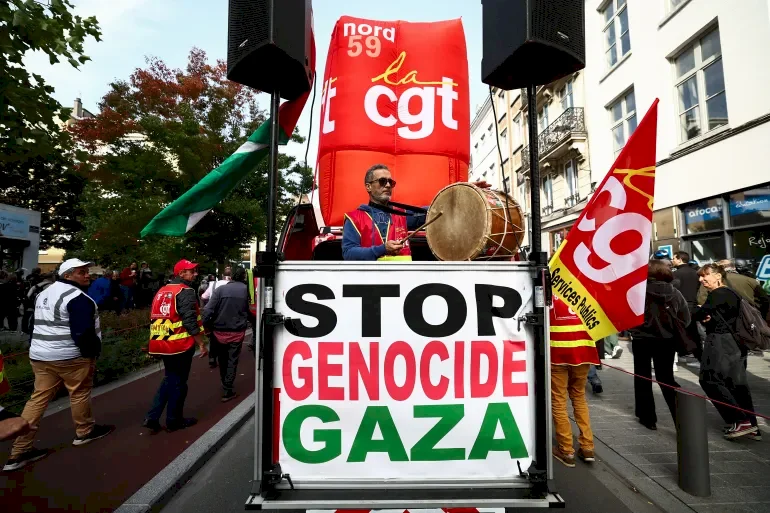
Independent: The People of Europe Have Pressured Their Governments to Change Their Position on Israel
SadaNews - Europe stood by the State of Israel since its inception and has been a good ally and economic partner, as evidenced by the continent's unconditional support for Israel's military policies in Palestine. However, this support has now "evaporated" with the growing discontent of European peoples towards the humanitarian disaster in Gaza, according to the British newspaper Independent.
The newspaper's report confirmed that the rising public anger has compelled the continent's leaders to demand Israeli Prime Minister Benjamin Netanyahu to stop the war and allow aid in after months of silence.
The reporter, journalist Sam McNeill, illustrated the European shift by pointing out that Italy joined Spain in protecting the "Solidarity Fleet" heading to break the siege on Gaza, although they later withdrew.
15 Demonstrations Daily
The report highlighted statements from the Global Conflict Monitoring Project that illuminated the impact of public anger in shaping Israeli-European relations, confirming that the number of pro-Palestinian demonstrations in Europe jumped from 780 over five months to more than 2066 recently.
The project confirmed that there are at least 15 demonstrations daily supporting Palestine.
With this public pressure, even Netanyahu - who is wanted by the International Criminal Court for committing war crimes in Gaza - admitted before the United Nations General Assembly that support for Israel has "evaporated quickly" over the past months, according to the report.
Independent noted that Italian Prime Minister Giorgia Meloni - known for her support of Netanyahu - declared her support for imposing sanctions on Israel following widespread protests last week, stating before the United Nations, "Israel has violated humanitarian standards and committed a massacre against civilians."
In contrast to Italy, Germany remains shackled by the legacy of its past sins towards the Jews, as German Chancellor Friedrich Merz expressed concern over what is happening in Gaza and reduced arms exports to Israel, but rejected the option of economic sanctions against it, according to the report.
Meanwhile, the report continues according to SadaNews monitoring, European Commission President Ursula von der Leyen acknowledged that Europe "needs to do more" to end the suffering in Gaza and proposed imposing additional tariffs on Israeli goods and punishing settlers and officials.
According to Lisa Musiol - head of EU Affairs at the International Crisis Group - von der Leyen's comment came in response to widespread criticism of her policies and pressure from EU staff, with a protest petition signed by over two thousand current employees and 390 former ambassadors and officials, according to Independent.
"Israel from Europe"
The report noted that this shift is shocking due to the close historical relations between the European Union and Israel, which developed after the end of World War II, and many Israeli Jews trace their roots to European Jewish communities that fled from Europe.
Independent quoted Sharon Pardo, a professor at Ben Gurion University in Israel, stating, "Israel is from Europe, and anyone who does not recognize that does not understand this country at all."
David Ben Gurion, Israel's first Prime Minister, established the foundations of economic, political, and cultural ties with Europe, according to Pardo's analysis, with the continent being Israel's most significant trading partner, the "main market for Israeli agriculture, and the primary source of arms."
Pardo believes that Netanyahu has disrupted this relationship, making Israel a "state opposed to the European Union that exerts its utmost efforts to harm and undermine the European integration project," referring to Netanyahu's cooperation with European populists.
This partially explains, according to the university professor who is an expert on Israeli-European relations, the changed stance of European leaders towards Israel.

High-level sources reveal to SadaNews: Washington seeks to hold a Gaza Reconstruction Conf...

9 Dead and Dozens Injured in Beit Shemesh, Shrapnel Hits Jerusalem, Haifa, and Tiberias

30 Bombs.. A "Unique" Moment Exploited by Washington and Tel Aviv to Target the Supreme Le...

Iran Confirms Khamenei's Death and Announces 40 Days of Mourning

Exclusive SadaNews: What is the Secret behind the Timing of the Israeli-American Attack?!

Israel Deducts 258 Million Shekels from Palestinian "Clearing" Funds for the Benefit of Fa...

Where Does the Second Phase of the Ceasefire Agreement Stand?!

